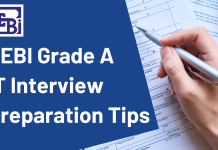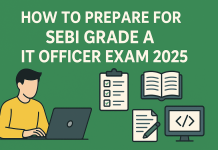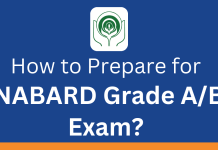SEBI (Securities & Exchange Board of India) the regulatory authority for the securities market in India, is anticipated to announce the SEBI Grade A Officer recruitment for 2025. Aspirants eagerly await the notification, encompassing crucial details such as eligibility criteria, application process, exam pattern, and syllabus. While the official notification is pending, candidates can refer to past years’ information to kickstart their preparation.
The SEBI Grade A Legal notification for 2024 was released on June 10, 2024, with the final results announced on January 3, 2025, providing valuable insights for prospective candidates. The notification for SEBI Grade A 2025 is expected soon. Aspiring to work at SEBI is a common dream, but many candidates, despite their enthusiasm, may face doubts and confusion during their preparation journey. Having interacted with numerous students, I often receive inquiries about successful candidates’ strategies.
Contrary to popular belief, success in competitive exams is not solely attributed to rigorous preparation and extensive experience. Some candidates successfully clear the SEBI Grade A exam shortly after graduation on the first attempt.
So, what sets successful candidates apart? Apart from the commonly discussed factors like rigorous preparation, practice, and revision, some additional tips and tricks can significantly enhance your preparation for the SEBI Grade A examination.

To delve into these methods and pave your way to success in the SEBI Grade A 2025 exam, explore our blog for comprehensive insights. Gain a deeper understanding of the strategies that can make a difference in your exam preparation journey. Prepare to conquer the SEBI Grade A exam with confidence and competence.
SEBI Grade A Eligibility Criteria 2025
The eligibility criteria for the SEBI Grade A exam in 2025 are eagerly awaited, and while the official announcement is pending, insights based on previous years’ criteria can provide valuable information. Candidates aspiring to apply for the SEBI Grade A exam should typically fall within the age limit of 30 years. The educational qualifications include a Master’s Degree in any discipline, a Bachelor’s Degree in Law, or a Bachelor’s Degree in Engineering from a recognized university. Additionally, candidates with qualifications such as CA/CFA/CS/CWA are eligible. For the SEBI Grade A Assistant Manager post, applicants must be Indian citizens, and individuals from foreign or neighboring countries are not eligible. Notably, the SEBI Grade A 2025 exam presents a favorable opportunity for fresh graduates, as no minimum work experience is required for the officer position. Check out the table below to understand the SEBI Grade A 2025 Eligibility Criteria in detail.
| Eligibility Criteria | Details |
| Age Limit | Up to 30 years |
| Educational Qualification | Master’s Degree, Law Degree, Engineering Degree, CA/CFA/CS/CWA |
| Citizenship | Indian citizens only |
| Work Experience | No minimum work experience is required |
SEBI Grade A Exam Pattern 2025
The Securities and Exchange Board of India (SEBI) is yet to release the official notification and exam pattern for the SEBI Grade A exam 2025. However, prospective candidates can draw insights from the SEBI Grade A 2025 exam pattern. The exam is anticipated to comprise two papers in Phase 1, both of which will be objective in nature.
It is expected that Paper 1 will cover General Awareness, including Financial Awareness and Quantitative Reasoning, and will be standard for all streams. Paper 2 is likely to be subject/stream-specific, including Commerce, Accountancy, Management, Finance, Costing, Company Act, and Economics, with multiple-choice questions. It’s crucial to note that Phase 1 is anticipated to qualify, with the marks obtained considered only for shortlisting candidates for Phase 2.
The SEBI Grade A 2025 exam pattern is expected to include Descriptive English and subject-specific papers. The Descriptive English paper has a weightage of 1/3rd, while the subject-specific paper has a weightage of 2/3rd. The aggregate cut-off for Phase 2 is expected to be 50%.
Prospective aspirants are encouraged to use the SEBI Grade A 2023 exam pattern as a provisional reference for their preparation until the official notification and exam pattern for SEBI Grade A 2025 are released. Staying tuned for updates is advisable to ensure accurate and detailed preparation. The exam pattern for both Phase 1 and Phase 2 is given in the table below:
| Subjects | Marks | Duration |
| General Awareness-(Financial Awareness, QRE) | 100 | 60 Min |
| Commerce, Accountancy, Management, Finance, Costing, Company Act, Economics | 100 | 40 Min |
| Descriptive English | 100 | 60 Min |
| Commerce, Accountancy, Management, Finance, Costing, Company Act, Economics | 100 | 40 Min |
SEBI Grade A Exam 2025 Syllabus
In preparation for the SEBI Grade A exam 2025, candidates need a comprehensive understanding of the syllabus to navigate each stage of the recruitment process. Phase 1 of the SEBI Grade A exam consists of two papers, with Paper 1 being shared for all streams. The syllabus for Paper 1 covers a range of subjects, including Quantitative Aptitude, English, General Awareness, and Reasoning. Topics in Quantitative Aptitude encompass various mathematical concepts, while English involves grammar, vocabulary, and comprehension. General Awareness includes financial and banking awareness, current affairs, and government schemes. The Reasoning section covers puzzles, seating arrangement, coding-decoding, and more.
For Paper 2, specific to Commerce & Accountancy, Management, Finance, Costing, Company Act, and Economics, candidates can expect questions related to accounting standards, financial statement analysis, management processes, leadership styles, financial markets, derivatives, costing methods, and relevant legal aspects such as the Companies Act, 2013. This detailed syllabus serves as a valuable guide for aspirants preparing for the SEBI Grade A 2025 exam. See the table below for a detailed understanding of the SEBI Grade A 2025 Syllabus.
| Section | Topics |
|---|---|
| General Awareness | Monetary Policies, Banking and Financial Awareness, Economic Terms, Current Affairs, Static GK, Financial and Economic News, Government Schemes. Agreement & Deals, Banking Terms- rates & processes, National Institutions, BeePedia |
| English | Grammar, Vocabulary, Reading Comprehension, Passage Making, Error Spotting, Jumble Words, Sentence Framing, Fill in the blanks |
| Reasoning | Puzzles, Seating Arrangement- Circular, Square & Linear, Data Sufficiency, Directions and Distance, Coding Decoding, Blood relations, Inequality, Syllogism, Machine input and output, Verbal Reasoning, Ordering and Ranking, Arrangement and Pattern, Scheduling, Distance and Direction, Ranking |
| Quantitative Aptitude | Simplification and approximation, Number Series, Quadratic Equation, Number System / HCF & LCM, Ratio and Proportion, Average, Partnership, Ages, Percentage, Profit & Loss, Time, Speed & Distance, Problems on Trains, Boat and Stream, Time & Work / Pipes and Cisterns, Simple and Compound Interest, Mixture & Allegations, Permutation and Combination, Probability, Data Interpretation (DI), Caselet DI and Data Sufficiency |
| Commerce & Accountancy | Accounting as a financial information system.Accounting Standards specifically refer to Accounting for Depreciation, Inventories, Revenue Recognition, Fixed Assets, Foreign Exchange Transactions, Investments.Cash Flow Statement, Fund flow statement, Financial statement analysis; Ratio analysis.Accounting for Share Capital Transactions including Bonus Shares, Right Shares.Employees Stock Option and Buy-Back of Securities.Preparation and Presentation of Company Final Accounts |
| Management | Management: its nature and scope; The Management Processes; Planning, Organization, Staffing, Directing and Controlling.The Role of a Manager in an Organization. Leadership: The Tasks of a Leader.Leadership Styles; Leadership Theories; A successful Leader versus an effective Leader.Human Resource Development: Concept of HRD; Goals of HRD.Motivation, Morale and Incentives: Theories of Motivation; How Managers Motivate; Concept of Morale; Factors determining morale; Role of Incentives in Building up Morale.Communication: Steps in the Communication Process; Communication Channels; Oral versus Written Communication; Verbal versus non-verbal Communication; upward, downward and lateral communication; Barriers to Communication, Role of Information Technology. |
| Finance | Financial System, Financial Markets, Basics of Derivatives: Forward, Futures and Swap.Recent Developments in the Financial Sector.Financial Inclusion- use of technology.Alternate source of finance, private and social cost-benefit, Public-Private Partnership.Direct and Indirect taxes; Non-tax sources of Revenue, GST, Finance Commission, Fiscal Policy, Fiscal Responsibility and Budget Management Act (FRBM).Inflation: Definition, trends, estimates, consequences, and remedies (control): WPI, CPI – components and trends. |
| Costing | Overview of Cost and Management Accounting – Introduction to Cost and Management Accounting, Objectives and Scope of Cost and Management Accounting, Methods of Costing – Single Output/ Unit Costing, Job Costing, Batch Costing, Contract Costing, Process/ Operation Costing, Costing of Service Sectors, Basics of Cost Control and Analysis – Standard Costing.Marginal Costing.Budget and Budgetary Control, Lean System and Innovation |
| Companies Act | The Companies Act, 2013 – Specific reference to Chapter III, Chapter IV, Chapter VIII, Chapter X, Chapter XI, Chapter XII and Chapter XXVII. |
| Economics | Demand and Supply, Market Structures, National Income: Concepts and Measurement, Classical & Keynesian Approach Determination of output and employment, Consumption Function, Investment Function, Multiplier and Accelerator, Demand and Supply for Money , IS – LM, Inflation and Phillips Curve, Business Cycles, Balance of Payments, Foreign Exchange Markets, Inflation, Monetary and Fiscal Policy, Non-banking Financial Institutions. |
Preparation Guidelines for SEBI Grade A 2025
A journey to conquer the SEBI Grade A 2025 exam requires a strategic and well-rounded preparation approach. Aspirants eagerly await official notifications, but without specific details, past years’ insights become invaluable. This guide provides comprehensive and effective preparation guidelines, offering aspiring candidates a roadmap to navigate through the extensive syllabus, exam pattern, and essential strategies for success in the upcoming SEBI Grade A exam.
- Create your cheat sheet: Developing a cheat sheet is a strategic approach to condense vast information, especially for topics like the Companies Act. Candidates create a quick reference guide for effective memorization by listing key points and formulas. This method aids in recalling factual details and numerical formulas efficiently, enhancing overall preparation.
- Utilize mind maps and flowcharts: Harness the power of visual aids like mind maps and flow charts to simplify complex concepts. Creating diagrams helps aspirants visualize information, making it easier to remember critical points. These graphical representations serve as quick references, facilitating a better understanding of various topics within the extensive SEBI Grade A syllabus.
- Regularly revise to minimize mistakes: Prioritize regular revision as a fundamental practice to minimize errors. Allocate dedicated time daily or weekly for revisiting topics, aiding in information retention and boosting confidence. Consistent revision is essential for reinforcing learned concepts, reducing the likelihood of mistakes, and ensuring a thorough understanding of the SEBI Grade A exam syllabus.
- Make Mnemonics to attain mastery: short-form representations of terms using initial letters are effective tools for memorizing factual topics with numerous subheadings. This technique is particularly valuable for recalling complex information efficiently. As SEBI Grade A covers various topics, creating mnemonics saves time during exams and assists in the swift recollection of necessary details.
- Do a thorough analysis of Mocks & PYQs: Beyond mere practice, meticulously analyze mock tests and previous year’s papers to gain insights into the exam pattern. Identifying important topics, understanding question difficulty levels, and assessing one’s strengths and weaknesses are vital aspects of this method. A thorough analysis guides candidates in refining their exam strategy and optimizing performance.
- Build concise notes for summarizing topics: Toppers often stress the importance of note-making for effective preparation. Developing concise notes encompassing flowcharts, mind maps, and mnemonics condenses information into 1-2 pages per topic. This skill aids in memorization and serves as a quick review tool during the exam, ensuring candidates are well-prepared for the SEBI Grade A assessment.
- Exercise reverse learning for correct assessment: Challenge the conventional approach by incorporating reverse learning. Start with mock tests to identify frequently asked topics and question patterns. Follow up with a detailed analysis to understand key areas for improvement. This method streamlines preparation by focusing on specific exam-centric topics, optimizing study time for better performance in the SEBI Grade A exam
- Strategic Time Management: Efficiently manage study time by prioritizing topics based on their weightage and relevance in SEBI Grade A exams. Identify high-scoring sections and allocate more time to strengthen weaker areas. This strategic approach ensures a balanced and targeted preparation, maximizing the impact of study hours and enhancing overall performance.
- Smart Exam Simulation: Simulate exam conditions during practice sessions to acclimate to the test environment. Ixambee provides SEBI Grade A mock tests and SEBI Grade A previous year papers that closely resemble the actual exam. Set strict time limits for each section, enhancing time management skills, speed and accuracy. Integrating mock tests with time constraints creates a realistic exam scenario, reducing anxiety and boosting confidence for the SEBI Grade A 2025 exam.
- Interactive Learning Platforms: Leverage technology for interactive learning experiences. Utilize online platforms like ixambee to provide SEBI Grade A online courses where candidates can participate in forums and discussion groups to engage with peers and experts. Sharing insights, discussing challenging topics, and participating in collaborative learning enhance comprehension. Interactive platforms provide diverse perspectives and valuable tips, fostering a dynamic study environment for SEBI Grade A preparation.
- Adaptive Learning Techniques: Embrace adaptive learning methods tailored to individual strengths and weaknesses. Identify and focus on challenging areas, adjusting study plans accordingly. This personalized approach ensures a targeted and efficient study routine. Utilize adaptive learning tools, practice quizzes, and self-assessments to tailor preparation to specific needs, facilitating a more effective and comprehensive understanding of the SEBI Grade A syllabus.
- Mindfulness and Stress Management: Incorporate mindfulness techniques and stress management practices into the study routine. Prioritize mental well-being to maintain focus and concentration. Meditation, deep breathing, and short breaks during study sessions alleviate stress. A balanced approach to preparation, including self-care, contributes to a positive mindset, enhancing overall readiness for the SEBI Grade A exam in 2025.
Subject Wise Tips and Tricks for SEBI Grade A 2025
- General Awareness: A robust preparation for the SEBI Grade A 2025 General Awareness section involves staying updated on current affairs, economic policies, and financial news. Regularly read reputable newspapers, magazines, and financial journals to grasp the latest developments in the financial sector. Additionally, you can focus on understanding the functioning of monetary policies, government schemes, and key national institutions. Engaging in mock tests and previous year question papers aids in familiarizing yourself with the exam pattern and refining your knowledge of important topics.
- English: Effective preparation for the English section of SEBI Grade A requires honing language skills and comprehension abilities. Emphasize grammar, vocabulary, and reading comprehension during your study sessions. Practice writing essays and descriptive passages to enhance your written communication skills. Regularly engage with diverse reading materials to improve comprehension and expand your vocabulary. Additionally, consider participating in group discussions or online forums to develop verbal communication skills and boost overall language proficiency, ensuring a well-rounded preparation for the exam.
- Reasoning: Mastering the Reasoning section for SEBI Grade A involves developing logical reasoning and analytical thinking. Focus on understanding different types of puzzles, seating arrangements, and coding-decoding. Practice data-sufficiency questions to enhance decision-making skills. Strengthen your grasp of verbal and non-verbal reasoning, including topics like syllogism and machine input-output. Regularly solve various reasoning problems and participate in mock tests to refine your problem-solving abilities and familiarize yourself with the diverse question formats that may appear in the SEBI Grade A exam.
- Quantitative Aptitude: Preparing for the Quantitative Aptitude section in SEBI Grade A involves mastering mathematical concepts and quantitative analysis. Strengthen your foundation in topics such as simplification, percentage, profit and loss, time-speed-distance, and data interpretation. Focus on solving numerical problems with speed and accuracy. Practice regularly to improve your mathematical aptitude and develop efficient problem-solving strategies. Utilize formula sheets and mnemonic devices to memorize key mathematical formulas. Regular revision and timed practice tests will help enhance your quantitative skills and boost your confidence for the exam.
- Commerce & Accountancy/ Management Finance /Costing/ Companies Act/Economics: Comprehensive preparation for the Commerce & Accountancy/Management Finance/Costing/Companies Act/Economics section of SEBI Grade A requires a deep understanding of financial concepts and regulations. Focus on accounting standards, financial statement analysis, and relevant sections of the Companies Act. Strengthen your knowledge of economic terms, market structures, and financial markets. Stay updated on recent developments in the financial sector and understand the basics of derivatives and fiscal policies. Regularly practice solving numerical problems related to finance and costing to ensure a thorough grasp of quantitative concepts within the scope of SEBI Grade A.
Summing Up
Aspiring candidates for the SEBI Grade A 2025 exam should adopt a holistic approach to preparation, incorporating strategic methods like cheat sheets, mind maps, and regular revision. The detailed understanding of eligibility criteria, exam pattern, and syllabus, based on past years’ information, provides a head start. The addition of effective time management, stress reduction techniques, and adaptive learning further enhances the preparation process. Leveraging interactive platforms and subject-specific guidelines ensures a comprehensive and targeted approach. With these strategies, candidates can confidently navigate the SEBI Grade A exam, aiming for professional success.
Are you preparing for the SEBI Grade A Exam? Boost your chances of success with ixamBee’s SEBI Grade A Phase 1&2 online course, designed by experts to cover the complete syllabus with top-notch study materials. Practice with SEBI Grade A mock tests and SEBI Grade A Phase 1 PYP to strengthen your preparation. Additionally, our Target Banking Online Course ensures a well-rounded approach to banking exams. Start your journey with ixamBee today!
ixamBee specializes in providing expert guidance and resources for banking exams 2025, ensuring that you are well-prepared for the Upcoming Bank Exams like RBI Grade B, NABARD Grade B, IBPS SO, and more. Our courses align with the bank exam calendar 2024, covering all the essential topics. With a focus on the upcoming bank jobs, our Previous Year Papers, BeePedia, SSC CGL, SSC CHSL, SSC MTS and other Mock Tests are designed to help you excel in upcoming banking exams.
Also Read
How to Prepare for SEBI Grade A 2025 Exam
SEBI Grade A Exam: Proven Preparation Strategies for 2025














